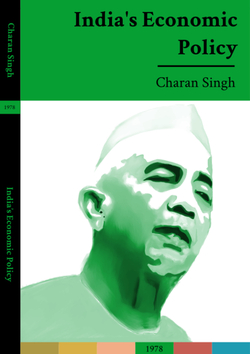Published in 1978 when Charan Singh was Union Home Minister and the Chairman of Janata’s Party’s Cabinet committee on economic policy, India’s Economic Policy: The Gandhian Blueprint lays out an alternate model for India’s development. This easy-to-read book is a succinct formulation of Singh’s principles to build India from the bottom-up. Singh is critical of Jawarhalal Nehru’s economic policy framework and the latter’s rejection of Mohandas Gandhi’s vision of an India with the village at its center. He prescribes a radically new policy blueprint, on Gandhian lines, in harmony with India’s geography, population, demography and democratic beliefs.
His economic policy targets the ‘three ills’of poverty, unemployment and disparities in wealth through higher agricultural production, maximisation of employment on land and by capital, reduced inequalities in incomes, and protection of labour from exploitation. Singh’s blueprint recommends a reversal of industrialization and the privileges its mostly urban beneficiaries enjoyed over agriculture and the village, and a complete overhaul of urban-elitist planning which had little contact with ground realities.
Singh stresses he is not opposed to industrialisation per se, but to the priority given to it over village India. He opposes mechanisation that replaces human labour, with which India is endowed to excess, as well as to the concentration of economic power it engenders in the hands of a few. He urges a break away from foreign technology as well as capital upon which all efforts at development had hitherto been predicated. His Gandhian prescription is the widespread application of labour- intensive techniques and small scale decentralised production, for the most part, all based on democracy engendering self-employment instead of the extractive Capitalist or totalitarian Communist systems.


